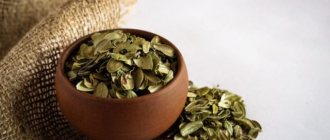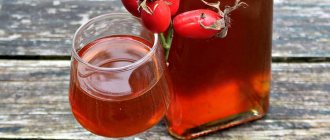When a child suffers from frequent colds, parents try to find a remedy that will help strengthen the immune system. Pharmaceutical companies offer vitamin complexes for any age and budget, but natural immunomodulators are more effective and have a minimum of contraindications. One such natural remedy suitable for children is rose hips.
Photo: Depositphotos.com. Author: OlenaKucher.
Fruit composition
Rosehip pulp contains a huge amount of useful elements necessary for the full development of the child’s body. You don’t have to buy it at the pharmacy - this plant is unpretentious and grows almost everywhere, so if you wish, you can collect the fruits in the forest or in the garden.
Substances contained in rose hips that are beneficial for children:
- Vitamin C (ascorbic acid) is important for the child’s body; helps to cope with colds more easily and avoid intoxication during illness. Occupies about 2% of the composition.
- Glucose is necessary for good metabolism in a growing body and promotes rapid cell renewal.
- Carotene - without it it is impossible to organize the correct digestion process in a baby.
- Vitamin E is contained in large quantities in rose hips and helps remove harmful substances from the body of children. It also plays an important role in the full development of the child’s reproductive system.
- Vitamin P (about 9%) helps strengthen the circulatory system.
- Linolenic acid is found in fruit seeds and is extremely beneficial for a growing baby.
In addition, rose hips contain copper, iron and potassium in sufficient quantity and form, which is easily absorbed by the child’s body and helps strengthen the musculoskeletal system.
Beneficial properties of brewed rose hips
Before talking about the positive qualities of the product, it is important to know about the unique chemical composition.
Both dried and fresh rose hips contain a significant amount of vitamin C, which makes it possible to enrich the human body with ascorbic acid all year round. Other elements are also present:
- calcium, magnesium, zinc, iron, etc.;
- ether compounds;
- organic acids;
- vitamins A, group B, E, etc.
Based on this, the following useful properties are distinguished:
- Brings blood pressure levels back to normal.
- It has a strengthening effect on the walls of blood vessels, preventing the development of atherosclerosis.
- Strengthens the immune system, acts as a preventative against colds and flu.
- Normalizes iron levels in the blood.
- Has a diuretic and choleretic effect.
- Anti-inflammatory actions.
- Removes harmful, toxic compounds from the body.
- Speeds up metabolism, reducing excess weight.
- Stabilizes blood pressure.
- Accelerates the healing process of wounds, burns, frostbite.
Rose hips also improve the functioning of the digestive system and vision. For treatment, not only the fruits are used, but also the root system and leaves.
- improve the functioning of the cardiovascular system, prevent the formation of cholesterol plaques;
- have a detoxifying effect: cleanse the liver, kidneys and gall bladder;
- eliminate chronic fatigue, increase body tone and overall performance;
- for women during pregnancy, they reduce the risk of developing intrauterine fetal anomalies;
- normalize water and electrolyte balance, prevent the development of gout and cholelithiasis;
- improve the rheological properties of blood;
- increase serum hemoglobin levels.
Organic acids inhibit the growth of pathogenic microorganisms and reduce the risk of developing an infectious disease. The berry-based drink has an antioxidant effect.
Tea with rosehip, the beneficial properties of which are due to the vitamin and mineral composition of the fruit, has a positive effect on metabolism. Due to its high ascorbic acid content, it is often used to strengthen the immune system.
Minerals maintain water and electrolyte balance, antioxidants help remove free radicals. As a result, the aging process slows down, skin, hair and nails look healthy.
- normalizes blood pressure;
- is a diuretic that removes stones and mineral salts from the renal pelvis and bladder;
- cleanses hepatocytes of toxic compounds, reduces the load on liver cells;
- prevents the development of atherosclerotic changes, vitamin C strengthens the vascular epithelium;
- reduces the risk of infection of the body;
- has a choleretic effect;
- starts the process of weight self-regulation;
- improves tissue regeneration of open wounds, burns of various etiologies and frostbite.
Benefits for children
The key benefit of rose hips is based on the high content of vitamin C. Just 10 berries contain the daily requirement of ascorbic acid for a preschool child. No other plant can boast such a concentration.
During viral infections, rosehip stimulates the body's protective functions and increases the ability to resist disease. Experienced parents claim that if, at the very beginning of a cold, the child is regularly given a decoction or tea made from rose hips, the baby will recover after a couple of days.
Interesting! During World War II, when there was an acute shortage of fresh fruit, British children were prescribed rosehip syrup to protect against infections.
Beneficial properties important for children's health are associated with a therapeutic effect in the following diseases:
- In case of chronic diseases of the gastrointestinal tract and pancreas, the action of biologically active substances in rose hips is aimed at activating certain enzymes, which helps alleviate the baby’s condition. Taking compote, tea or decoction will show good results in case of poisoning or diarrhea.
- Hair loss in childhood requires comprehensive treatment. Eating rose hips will make up for the lack of vitamins and microelements and thereby help get rid of the problem.
- For iron deficiency anemia in a child, taking rose hips is indicated in combination with other therapeutic measures.
In addition, rosehip decoction has antimutagenic properties. Substances that cause mutations in healthy cells enter the child’s body every day, and it is impossible to prevent this process. However, regular consumption of rosehip-based drinks allows you to minimize the damage from the harmful effects of such substances.
Secrets of proper cooking
All rosehip preparations can be divided into two parts: decoctions and infusions. Naturally, this does not include jelly and compotes, because... these are more healthy culinary dishes than medicines.
How to prepare rosehip decoction
Rosehip decoction for children
Decoction is a long-term heat treatment of a product. During the cooking process, the main medicinal component of rose hips, vitamin C, is destroyed. Therefore, preparing it is ineffective to strengthen the immune system. The remaining vitamins and microelements - carotene, for example - remain, and the therapeutic effect is preserved. The decoction is useful for pancreatitis, for weight loss, for general strengthening of the body after illness or stress, and for heart disease. The next note: a daily dose of vitamins contained in 15 rose hips (2 tablespoons of dry fruits) is sufficient for the body.
Decoction of fresh fruits. Wash the berries, crush them, remove villi, which cause an allergic reaction and irritate the mucous membrane of the throat. Throw the prepared berries into boiling water - 100g (3-4 tablespoons) of rose hips per liter of water. Boil for no more than a quarter of an hour, then wrap and leave for 3 hours to a day. Strain! Drink the age-appropriate dosage throughout the day.
A decoction of dry fruits. It’s prepared in the same way, but you don’t need to crush the berries; Take 6-8 tablespoons of dry rose hips per liter of boiling water.
How to make an infusion of rose hips
How to properly prepare rosehip infusion
Since this drink is not subjected to strong heat treatment, it retains most of the vitamin C, it is effective for boosting immunity and for treating all other diseases for which rose hips are indicated.
- Infusion of fresh berries. Crush the berries and remove lint and seeds. 1-2 tablespoons of rosehip in 1 liter of boiled water. Wrap and leave for 4 to 24 hours. Strain the infusion and drink a third of a glass three times a day.
- Infusion of dry berries. We do not crush dry berries (2-4 tablespoons), but only rinse them, fill them with hot water (60˚) and leave for 24 hours.
- Infusion in a water bath. Chopped fresh fruits (2 tablespoons) are poured with half a liter of hot water and placed in a water bath with barely boiling water for 15 minutes.
With proper and regular use of rose hips with its variety of biologically active substances, our children will grow up strong and healthy without any unnecessary medications.
Jul 18, 2016Violetta Lekar
At what age should it be given?
“From how many months can you give a child decoctions and compotes from rose hips without consequences?” – this question worries many parents, especially if they decide to take a closer look at their baby’s immunity.
Despite the impressive list of beneficial properties, rosehip drinks can provoke an allergic reaction in a child due to the variety of vitamins and other highly active substances in the fruit. Taking this into account, it is not recommended to give them to babies under 6 months of age.
When the child turns six months old, you can start adding pureed berries to puree, but no more than 2 pieces per day. At the same time, it is important to carefully monitor the baby’s reaction to a new product and wait a few days after the first feeding to make sure there is no allergy.
A high content of vitamin C has an adverse effect on tooth enamel, so compotes, teas and decoctions should be given to the baby to drink through a straw.
For therapeutic and preventive purposes, rose hips are taken in the morning so that the diuretic effect of this drug does not disturb the child during night sleep.
An increased need for consuming rose hips appears during the period of colds, which begins in the fall and ends closer to spring. Due to the high content of vitamins and anti-inflammatory properties, rosehip decoction and infusion significantly strengthen the immune system, allowing the child to avoid a viral attack.
How to brew correctly?
Photo: Depositphotos.com. Author: rozmarina.
Despite the benefits of these fruits, they must be brewed strictly according to the rules, maintaining the concentration recommended for the child’s specific age.
It is important for children to use special recipes for preparing rosehip-based drinks.
Effective decoction
Preparing rosehip decoction is not at all difficult - just wash 3-4 tbsp. l. berries and pour 1 liter of hot boiling water over them. But you should be more careful with the dosage when you plan to give the drink to a small child. The maximum permissible amount of decoction depends on age.
- A six-month-old child should not take more than 20 ml per day (1 tablespoon). It is advisable to give the decoction in the morning after breakfast so that you have time to observe the reaction during the day.
- If no allergies were noticed, after a year you can increase the dosage to 50 ml per day.
- From two years to school age, the child is given 100 ml of decoction during the day.
- One glass a day is enough for schoolchildren.
It is necessary to drink decoction and other drinks with rose hips in weekly courses with mandatory breaks. Otherwise, calcium is washed out of the body, which is harmful to the development of the child.
Vitamin tea
A variety of children's teas with the addition of rose hips are sold in pharmacies and specialty stores, allowing you not to think about brewing methods and acceptable dosage. But many parents prefer to prepare tea for their babies themselves.
Brew a drink for a child in one of two ways:
- Wash and chop 2-3 fruits and pour a glass of boiling water. After 5 minutes, the tea is ready to drink. It is enough to cool it or dilute it with cold water.
- For older children, add 1 crushed rosehip berry to regular black tea and pour boiling water over it.
A child over one year old is offered tea with rose hips no more than once a day.
Healing infusion
There are at least two cooking options:
- Rinse 20 g of dried fruits and add water, put on fire and simmer covered for 10 minutes. After this, remove from the stove and leave to infuse for 3-4 hours.
- Place the washed berries in a thermos and pour boiling water (the proportions are the same), close the lid and leave to steep overnight.
Rosehip infusion is offered to children in the same quantity as the decoction, but the daily intake is divided into several doses.
How often can you drink rose hips?
Herbalists recommend taking infusions internally in courses, the duration of which is selected individually. Despite the fact that when brewed, berries benefit various human organ systems, one should not forget about possible intolerance to the constituent components. If contraindications are ignored, home tea therapy will worsen the course of the disease.
Therefore, in addition to knowledge about the benefits and harms of rosehip infusions in a thermos (teapot), you need to find out how often you can drink them. When purchasing ready-made dry raw materials in pharmacies, you must carefully study the instructions for use. The norm for adults is one glass of decoction per day, which should be drunk in several doses. During pregnancy, women can take 70-100 ml of berry tea, which relieves attacks of nausea in the first trimester.
Parents should remember that rose hips can cause an allergic reaction, so pediatricians do not recommend giving tea to infants under 6 months of age. One-year-old children can drink two tablespoons of decoction per day.
As the child gets older, the dose increases:
- from 2 to 5 years – 4 tablespoons;
- from 6 years – 70-80 ml.
The duration of the course of taking rosehip tea is prescribed by the attending physician, taking into account the patient’s health condition.
Harm and contraindications
Despite the many beneficial substances in fruits, their high concentration can harm children's health.
Drinks with rose hips are strictly contraindicated for the following diseases:
- high stomach acidity;
- stomach ulcer;
- problems with bile secretion;
- dermatological diseases;
- individual intolerance.
Excessive consumption of decoctions and infusions can lead to unpleasant consequences:
- Thinning of tooth enamel. Preventive measure: after drinking a glass of broth, you need to rinse your mouth with clean water. Young children should only be given the drink through a straw.
- Increased risk of non-infectious jaundice.
- Complication of the condition with frequent constipation in a child due to the astringent components in the composition of rose hips.
Reasonable course use of medicinal drinks in compliance with dosages will protect your child from possible side effects and will only bring benefits.
Recipes for children's table
In addition to decoctions, infusions and teas, there are many recipes that help diversify a baby’s diet with rose hips, thereby increasing his immunity.
Jam
To make jam from rose hips, you need to work hard. But it will be an excellent help during epidemics. In addition, this jam is also very tasty.
The number of berries in the recipe is indicated taking into account the preparation: the fruits are divided into halves, and all the seeds are extracted from them.
Ingredients:
- 3 cups fresh berries;
- 3 cups sugar;
- 1 glass of water.
Cooking method:
- The washed fruits are poured with boiling water and cooked for 2-3 minutes. After this, drain the water into a bowl and rinse the berries with cold water. This is necessary so that the skin becomes soft.
- Prepare the syrup: a glass of the liquid in which the rosehip was just boiled is mixed with 3 glasses of sugar and brought to a boil over low heat.
- Pour the fruits into the syrup and turn on high heat until foam appears.
- Skim off the foam, reduce the heat to low and cook until tender.
By adding thin slices of apple to the jam, you can increase the amount of the finished product and its vitamin value. This will have virtually no effect on the taste.
Kissel
If your child loves jelly, you can make it from rose hips. It turns out rich, tasty and very healthy.
Ingredients:
- a glass of berries;
- 1 liter of water;
- 60 g sugar;
- 20 g starch.
Cooking method:
- Wash the fruits and pour boiling water over them, put on fire, close the lid and cook for about 15 minutes.
- After this, let the broth brew for 6 hours, add sugar and strain.
- Pour a glass of broth and add starch to it, mix thoroughly.
- Place the rest of the liquid on the fire and bring to a boil, then gradually pour in the prepared glass of broth with swollen starch.
- Stirring, bring to a boil and cool.
Compote
Every housewife can prepare compote from rose hips; this recipe does not require any special skills.
Ingredients:
- a glass of rose hips;
- 1.5 cups sugar;
- 1 liter of water.
Cooking method:
- Wash the rosehips, place them in a thermos and pour boiling water over them.
- After half an hour, pour everything into a saucepan, add sugar and bring to a boil.
- After cooling, the compote can be given to your child.











